How to remove mugshots from the Internet: a step-by-step process
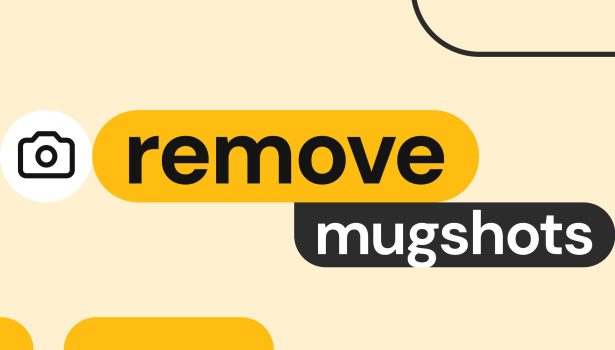
A mugshot (or booking photo) is a portrait of a person from the shoulders up, usually taken by the police when a person is arrested, or “booked”, for a criminal charge.
Mugshots are part of arrest records which are considered public information in most states. These records are openly accessible to the general public and can be easily found online. Moreover, after being released by law enforcement, they are quickly picked up by data brokers and mugshot sites and disseminated across the Internet.
While mugshots are invaluable in the processing of offenders, having them published online can be extremely damaging to your online reputation, personal relationships, and careers. They imply a criminal act and criminal charges, even if you were found not guilty or the charges were dropped.
Fortunately, there are steps you can take to remove mugshots from the Internet. Keep reading to learn what options you have and how to approach the whole process.
To remove a mugshot from the Internet, first address the websites that publish it. Next, reach out to Google and request to remove the remaining links from its search results. Another option is to suppress the pages containing the mugshot by generating positive content that will rank higher in the search results. If necessary, seek legal assistance or reputation management services.
The mugshot removal process
Can I get my mugshot removed from the Internet?
In most states, mugshots and police reports are part of public records which makes them openly available to the general public. That is done to ensure accountability and the free flow of information produced by government agencies. However, that also puts limitations on how such records can be removed.
Ideally, your best option is to first expunge or seal the arrest and court records related to your mugshot. Expungement is a court-ordered removal of records from public documents. Sealing doesn’t erase the records altogether but hides them from public access. Once your arrest record is officially removed from public view and you have relevant official documentation, it will be easier to craft a demand letter stating legal reasons for the removal.
Note that mugshot sites are under no legal obligation to remove your mugshot. Yet, it’s still possible and you should reach out to the website owner with a request in any case.
How to remove mugshots from Google?
It’s important to understand that Google itself doesn’t publish mugshots or any other personal information. Instead, the most popular search engine crawls the sites that do, indexes their pages, and displays links to these pages in its search results.
Thus, to remove mugshots from Google, it’s better to first tackle the websites that publish them.
Contact the sites
Taken by law enforcement, mugshots are part of public arrest records. However, it’s not just government websites they end up on. Booking photos are also picked up and shared by third-party platforms, mainly data brokers and mugshot sites like Mugshots.com and Arrests.org. These companies collect data from public records and various other sources, combine it into personal reports, and publish them online.
Besides booking photos and legal records, data brokers profit from sharing lots of other private data including home address, contact details, family ties, professional background, and current place of employment. Such a rich variety of details helps these online databases rank high on Google and other search engines and makes them a go-to place to research someone.

Notably, they don’t usually verify the information they share, resulting in false legal charges attributed to a person with the same name as the actual offender. Moreover, mugshots and arrest records remain on these sites even if the charges have been dropped.
Fortunately, most data brokers have opt-out procedures in place. To remove your mugshot photos and other personal information, look for “Do not sell my information/ Remove my record/ Suppress my info” links in the website footer or profile page.
Note that once you opt out of the biggest ones, smaller sites will pop up in the search results for your name. There are hundreds of data broker websites out there and it’s necessary to locate and remove yourself from each one that publishes your info.
If a platform doesn’t have clear opt-out procedures in place, contact the site owner or the author of the post containing your mugshot and ask to have it removed. If there are no contact details provided, try the Whois search which will give details about the domain registrar.
Contact Google
If certain websites refuse to remove your mugshot, you can still try to kick such pages out of the search results by contacting Google directly. However, it should be noted that Google has strict policies and they might deny your request if they believe that the information in question is of high public interest.
One option is to submit an image removal request to Google via their form. Another option is to operate directly from the search results: click on the three dots to the right of the link, select “Remove result” in the pop-up window, and follow the prompts.
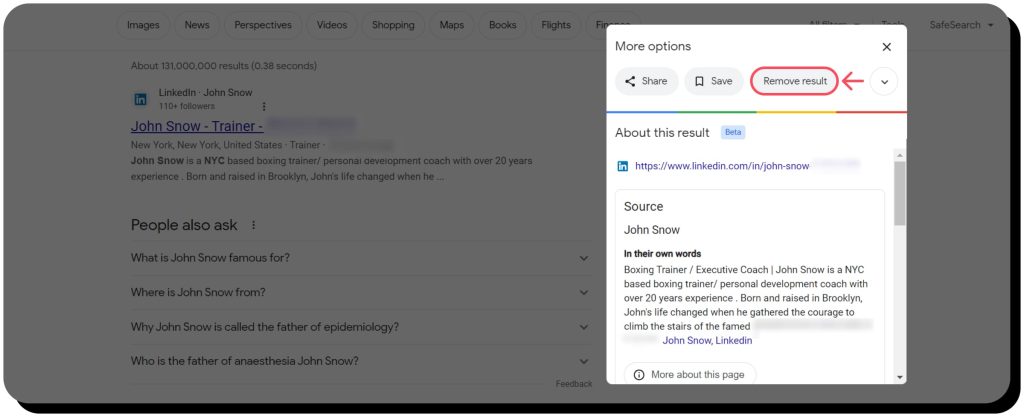
The third option is to use the “Results about you” tool that helps find pages that contain your personal information. The advantages of this tool are that it’s likely to locate the links you wouldn’t easily find yourself and you can request their removal right via the tool.
In case you’ve been able to remove the original page containing your mugshot from a website but the link is still visible in Google search results, use the “Refresh outdated content” tool.
Bury your mugshot online
If you can’t have a mugshot removed from a site and contacting Google doesn’t work either, you can try manipulating search engine results to “bury” the negative image.
This involves creating positive content on various platforms that will rank higher than the pages containing your mugshot. Such positive content ranges widely and includes social media profiles, professional profiles like LinkedIn, personal blogs, business websites, portfolios, press releases, media mentions, reviews, and so on.
By adding such links to search engine results, you make it less likely that people will find your booking photo online. However, keep in mind that this strategy has no guarantees, as a specific search (such as “{your name} mugshot”) will likely still pull up the image.
How to remove your mugshot from social media?
The most direct way to remove a mugshot from social media is by contacting the party that posted it and requesting to take it down.
If that brings no results, you can appeal to the content moderation rules of the social media platforms where the photo has been posted. Many social media sites have strict policies in regard to content that may be interpreted as bullying, doxxing, hate speech, or disrespect. For example, Facebook has specific privacy and removal policies and will remove “content that shares, offers or solicits personally identifiable information or other private information that could lead to physical or financial harm, including financial, residential, and medical information, as well as private information obtained from illegal sources.”
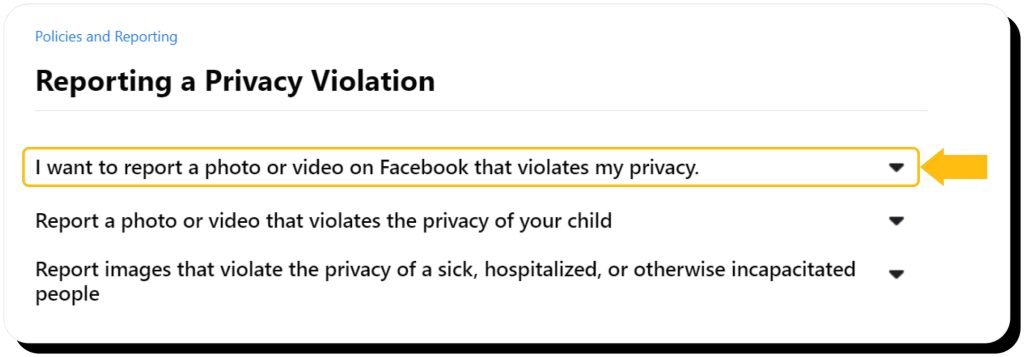
The cost of mugshot removal
The price you might have to pay to remove a mugshot depends on the website it’s posted on, who’s handling the process, the complexity of your case, and the laws and regulations in your jurisdiction.
Most data brokers and mugshot websites let you opt out and remove criminal records for free. However, some platforms may demand that you pay a fee. Note that such practices are generally considered exploitative and you can request Google to remove these links from its search results.
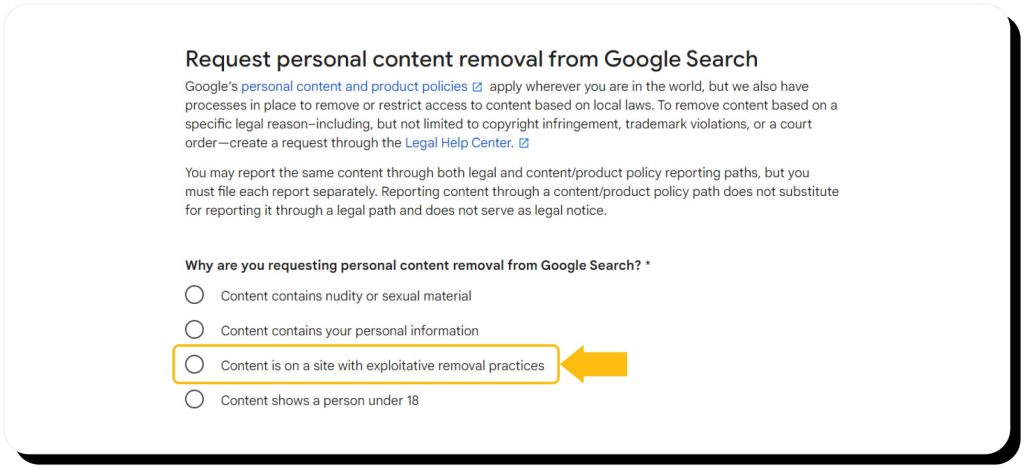
In case you turn to mugshot removal services, costs also differ and range from a few hundred dollars to several thousand. Many mugshot removal websites provide additional reputation management to ensure the best results, which ultimately results in higher prices.
Additional fees may occur if a legal process is involved. The cost of legal representation varies depending on the complexity of the situation and the rates charged by the attorney.
Tips for mugshot removal success
- The process of having a mugshot image removed can seem stressful and time-consuming but it’s important to be persistent. Often, repeated attempts are required for a website to take online arrest records down.
- Remember to keep an eye on the Google search results for your name and data brokers – new pages may pop up at any time. Mugshot removal is not a one-time task but a process that should be dealt with systematically.
- A good step would be to familiarize yourself with the laws regarding mugshot image removal in your jurisdiction. This will allow you to understand your rights and leverage the applicable regulations.
The legal options for mugshot removal
As of now, there aren’t any nationwide laws regarding sharing mugshots online and most states legally allow the publication of arrest records. Some, however, have explicit laws prohibiting the publication of mugshots or taking fees for their removal and outline legal ramifications in case of violations. Here’s a brief overview of several laws:
- Georgia law outlines 8 circumstances under which a commercial site must remove mugshots at no charge within 30 days of the date the individual sends a written request to the company
- California law prohibits law enforcement from publishing mugshots of those arrested for minor offenses on social media
- Florida law states that written booking image removal requests must be complied with for free within 10 days regardless of whether the person was found guilty or not
- Under Illinois law, police departments are required to obtain written permission from an individual before releasing their mugshots online. Moreover, if the individual isn’t charged with a crime, they can request all records of the incident to be destroyed within 30 days after the arrest
- New York law bans the release of mugshots online unless it “will serve a specific law enforcement purpose.” However, this wording is interpreted differently by various departments
- Virginia law prohibits the public release of booking photos unless it’s crucial for public safety, a judge orders the release, or as part of an investigation
You will likely need to hire an experienced mugshot removal attorney to assist you with the process. They are experts in which mugshot removal laws apply, where they apply, and how they apply to your particular situation.
FAQ
How long does it take to remove a mugshot from the internet?
The amount of time required to remove a mugshot online depends on the method(s) you use, the particular website it's on, and the state laws and regulations applicable in your case. Data brokers and mugshot websites may take anywhere from a few days to a few months to delete your photo. Meanwhile, if the legal process is involved, it can take much longer. Mugshot removal services or an experienced lawyer might help speed up the process since they have relevant knowledge and understand what techniques work best.
Can mugshots be removed for free?
Yes, in some cases you can have online mugshots removed at no charge. Free removal options include opting out of data brokers and mugshot websites, asking other third-party sites to erase mugshots, and requesting to remove links containing the photo from Google search results. Depending on the jurisdiction and the circumstances of your arrest, you may be able to send a cease and desist letter or file a complaint with relevant authorities if the website is violating any laws or regulations.
What are the risks of not removing a mugshot?
Mugshots imply that a person has criminal offenses and was found guilty, whether or not that is actually the case. This can have profound impacts on personal and professional relationships, online reputation, career advancements or employability, business opportunities, and financial opportunities. Mugshots also often contain sensitive data such as your name, date of birth, and arrest details. Having this information easily accessible online makes you vulnerable to identity theft and harassment.
Are mugshots copyrighted?
The legalities surrounding any copyright issues of mug shots vary by jurisdiction and depend on specific circumstances. In general, US copyright law states that the author of a photo is its initial legal owner. In the case of mugshots, the legal owner is the law enforcement agency that was booking the offender. However, each jurisdiction has its own regulations governing the access, dissemination, release, and use (including for commercial purposes) of mugshots.

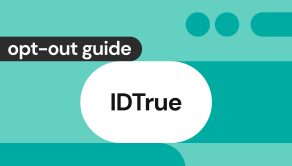



With over 8 years of experience in the field, the Onerep editorial team has deep expertise in data brokers, privacy violations, and fraud prevention. Through extensive research and conversations with customers, we’ve gained key insights into prevalent scams, data protection challenges, and common concerns around data exposure.